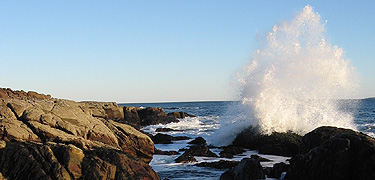
 Acadia National Park. (From the National Park Service) |
It's always been a requirement of mine: finding a moment of quiet solitude where I can commune, uninterrupted, with nature. Since moving to New York City, however, the quest isn't easy. So, when my Florida-based family invited me to join them for a week's getaway in Maine, they didn't have to ask twice.
For some of the Leibach clan, I suspect the allure of the trip lay, at least in part, in the prospect of nightly feasts on locally-caught lobster (a decent seafood selection when it comes to sustainability; see the Blue Ocean Institute's ranking here). But as we also share an affinity for the great outdoors, we devoted several days to traipsing around the state's coveted refuges and parks.
Our visit to the Petit Manan National Wildlife Refuge was surely a highlight of the trip. Part of the Maine Coastal Islands National Wildlife Refuge--a system totaling 8100 acres, including 49 offshore islands and three coastal areas--Petit Manan is a premier spot for seabird-watching, hosting several lively tern colonies, Atlantic puffins, and gulls--lots, and lots of (noisy) gulls.
When we arrived around 2:30pm, the tide was out, and our dexterous guide (Audubon's field editor, Frank Graham Jr.) proposed a beach-combing sojourn along the crescent-shaped coast. We happily complied, and although we didn't discover any pirate booty, the moose and seabird tracks--along with a few spider sightings later on (one, a species Frank himself discovered several years ago and discusses in The Journal of Arachnology)--proved that there are plenty of natural treasures hiding along the coast. (For Frank's take on Petit Manan, read Audubon's National Wildlife Refuge Centennial.)
 Scenic View of Acadia National Park. (From the National Park Service) |
Another bright spot occurred during a hike in Acadia National Park, a region comprised of a paradaisical cluster of islands with forested mountains and rocky shores. There, spruce and fir trees, like upended ice cream cones, dot balding granite heads whose striations speak to centuries of glacial activity.
As we carefully wended our way up a root-lined water flow, my father suddenly halted. Immersed in the solitary woods, the silence was unfathomable to one so accustomed--inured, even--to city cacophony. Then, as if out of thin air, a brownish form appeared, stepping gingerly toward us. I stood breathless, half-expecting it to be that dinosaur in Jurassic Park--the "cute" but deadly venom-spitting one with the bristling fangs and deafening shriek. Turns out, my flight of fancy wasn't so off-base--evolutionarily speaking, at least--for what approached us was a curious bird--a ruffed grouse, to be exact.
Stepping gingerly amidst the plant detritus, it inspected my father with nary a sign of suspicion. After we admired its attractive brown plumage, flecked with white, we continued our trek--chaperoned for several more yards by our handsome modern-dinosaur. Finally it stopped, as if allowing us our privacy. We pressed on to the summit in quiet contentment, rejuvenated by our brush with something wild and fearless.
